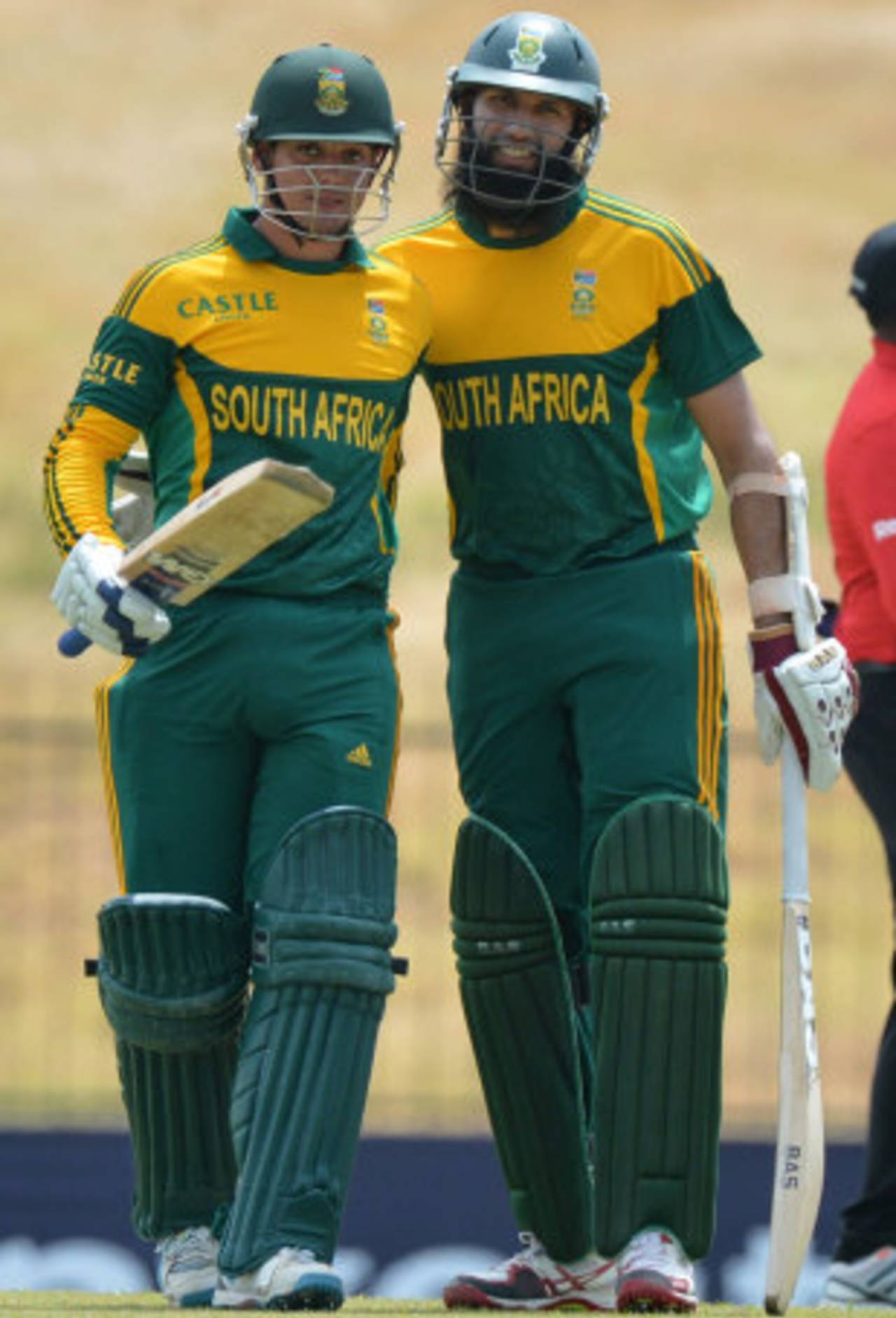Hashim Amla and
Quinton de Kock don't appear to have much in common. Amla is experienced, de Kock is just starting out, Amla commands respect, de Kock attracts awe and while Amla has admitted to being a deep thinker, de Kock is self-confessed about being exactly the opposite. But look a little closer and there are more similarities than first meet the eye.
Both Amla and de Kock were identified as promising prospects at school, both captained the national Under-19 side and both had shaky starts to their international careers, which required a rethink in approach before they saw success. Now both open the batting for South Africa's fifty-over forces and will continue to do so for the foreseeable future.
That South Africa have rubber-stamped the pair shows the progress they have made from just over a year ago when they rotated through four different duos in a five-match series in Sri Lanka and then swayed between other options in the series which followed against Pakistan. Graeme Smith, Colin Ingram and Alviro Petersen were some of the candidates considered to partner one of Amla or de Kock but as South Africa have since discovered, the secret was moving past the others and putting the latter two together.
In just 14 innings, Amla and de Kock are already South Africa's
seventh-most successful opening pair and they have a better average than any of the six above them. Only Smith has partnered Amla more successfully. Already, Amla and de Kock have the same number of century stands (4) as Andrew Hudson and Gary Kirsten did and more than Amla and Smith (2) and Hudson and Kepler Wessels (3).
Best of all, Amla and de Kock seem to enjoy each other's company more than some of the pairs of the past. "There's a bit of chemistry between myself and Quinny; we get on quite well," Amla said. "He is quite an entertaining guy to bat with. He is extremely attacking but he is also quite smart in the way he plays his game. It's not just reckless shots, it's quite calculated stroke-making."
De Kock's development from a wild-child to a wily wielder of willow has been his biggest improvement over the last 12 months. His ability to hit the ball hard and place it well was built-in along with the tendency to waft outside the off stump. The latter threatened to overshadow the former until de Kock took action.
Following a poor series in Sri Lanka last year, de Kock requested extra net sessions with his franchise coach Geoffrey Toyana, tightened up and honed his work ethic. "We all knew he was an exceptionally talented player from the domestic scene and ever since he has come into the team, he has shown a willingness to improve," Amla said. 'He had a difficult one-day series in Sri Lanka and he went off and worked and the next thing we knew he was scoring more runs."
When de Kock's self-inflicted boot camp was over, it took him just two matches to score his first international hundred. That was followed by three consecutive centuries against India, to make him only the fifth batsman in the world to string together that kind of success. Another hundred came in Sri Lanka and de Kock had an opportunity to rack up a sixth in Bulawayo but Zimbabwe ended his 100% conversion record.
Although de Kock did not reach the milestone, the opening stand he took part in set South Africa up for a big win, and he did most of it almost single-handedly. De Kock scored 42 of the 46 runs that came between overs five to nine to ensure the run-rate did not stagnate early on. "If he gets off to a good start, it gives me time to build the partnership with him," Amla said. "And if I get off to a good start, it gives him a bit of leeway to settle in."
The give and take between Amla and de Kock is the reason they are already climbing the statistical ladder. While Amla's aggression in shorter formats has increased exponentially in recent years, he is probably a more natural careful starter. De Kock is the opposite and likes to burst open in the beginning before quietening down later on, if at all.
Their different approaches mean South Africa have some certainty their starts will not just be solid but speedy too. The Amla-de Kock partnership already has an average run-rate of 5.17 to the over,
the second-highest for all South Africa opening pairs who have played at least 10 innings.
Those confident starts set the tone, which is something South Africa sometimes struggled to do in the past. And if that tone is too high-pitched, does Amla ask de Kock to turn it down? "No, he doesn't listen to me," Amla joked. "I don't tell him what to do. I just see my role as playing to the situation." So they are different, after all.
Firdose Moonda is ESPNcricinfo's South Africa correspondent
